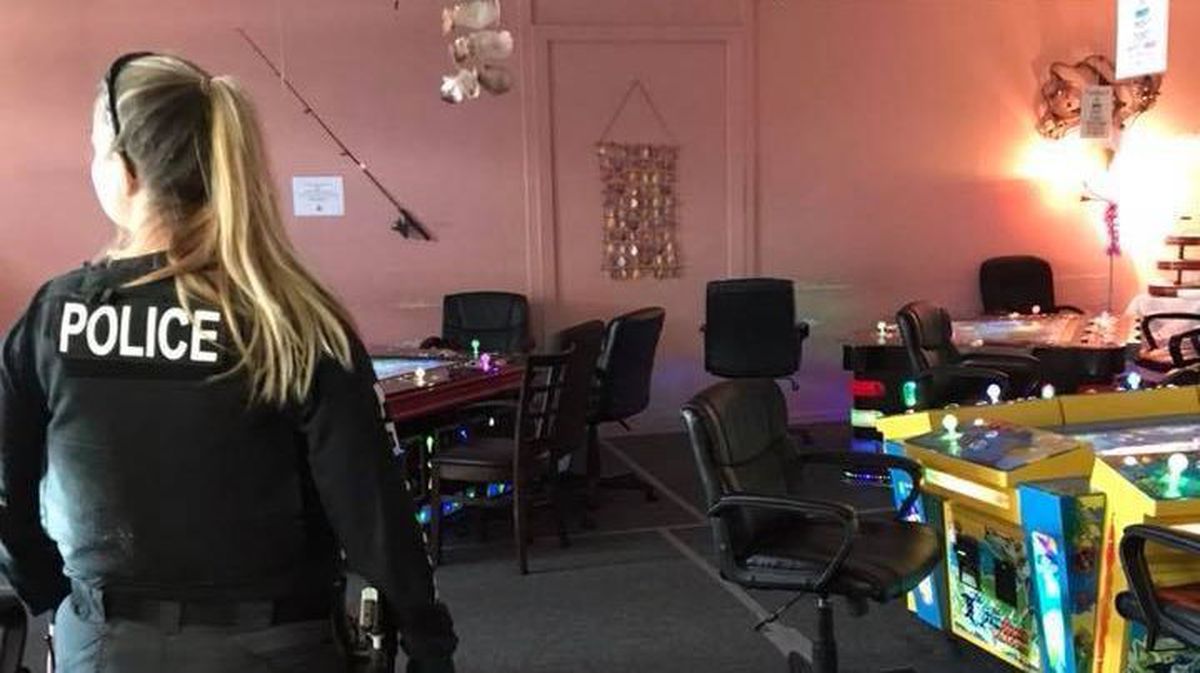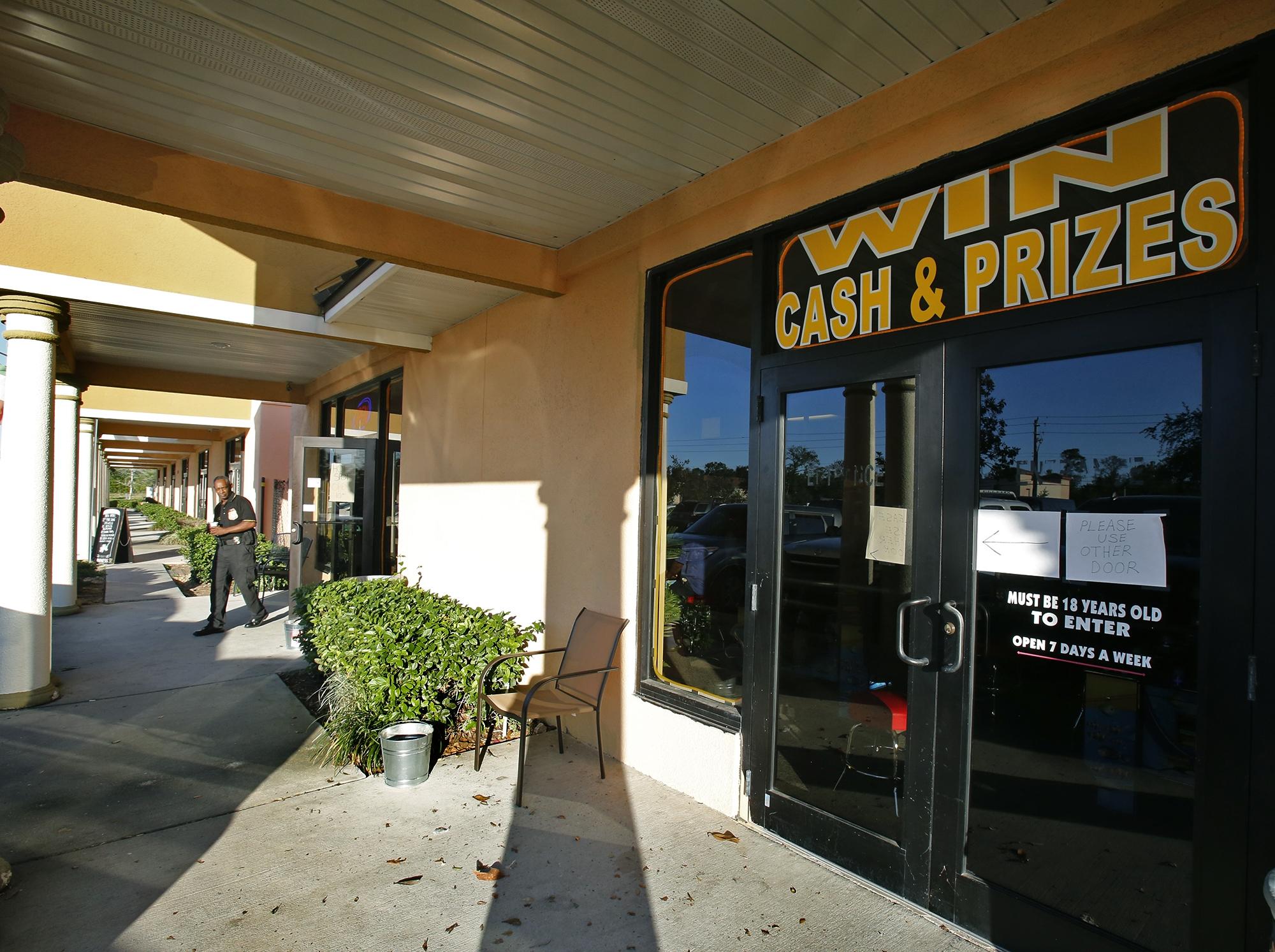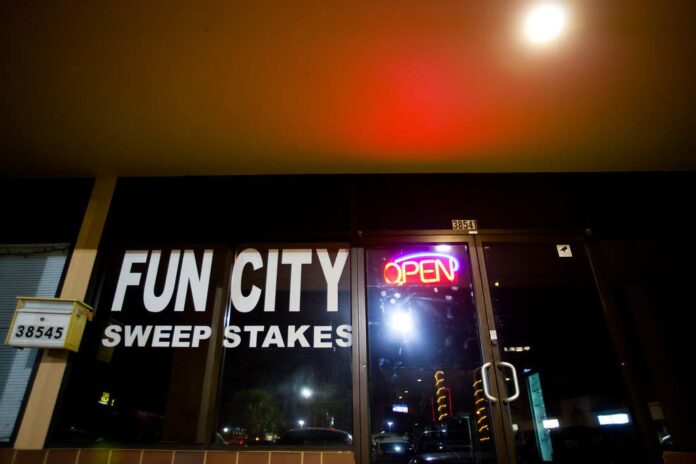Strip-Malls Are Being Overrun By “Sweepstakes” Parlors
Elected municipal officials are powerless against the proliferation of strip-mall casino’s in Florida, and the gambling den operators who are gaining an enormous amount of power and influence in Tallahassee.
Strip-mall casinos continue to spread across Florida while municipal governments are left without the resources or laws that would enable a community to stop these mini-casino’s from doing business within their jurisdictions. State law allows them to operate so unless the state constitution is changed, each municipality that wants to regulate the strip mall casinos would have to pass local laws to do so. The question as to whether state law overrides local law is now being challenged in ongoing court battles between county leaders and the strip-mall casino operators.
“Without a change in the state constitution to regulate or ban the mini-casino’s, we are going to continue to be targeted by out-of-state profiteers who come to Florida to pick the pockets of our elderly citizens,” said Steven Bailey, a Miami tea party leader. He continued, “these unregulated gambling schemes have been designed to pervert the true intention of the law, but loopholes in the state constitution allow these businesses to flourish.”
Local governments are loosing the battle to prevent the storefront casinos from opening within their boundaries, which is evidenced by the many storefront casinos that remain open in communities that do not want them and are in fear of violence from the unprotected mini-casino venues. Once they get a foothold in a community, the storefront casino operators fight vigorously to defend the cash-flow.

Municipalities that have tried to shut down the mini-casino’s through law enforcement efforts have failed. As Seminole county officials inch closer to shutting down strip-mall casinos’s throughout their county, the gambling parlor owners have fought back with aggressive legal tactics that have stalled any effort to shut them down. The battle lines have now been drawn and it looks like Florida residents are destined for a protracted and costly legal battle to regulate gaming in Florida, one county or city at a time – at taxpayer expense.
The only way to curtail the rapid expansion of strip-mall casinos is to create a state gaming commission through a statewide referendum or through legislative action, to close the loopholes that allow these games to continue. The Florida legislature has already been given multiple opportunities to pass gaming reform bills that would have created a gaming commission that would define and enforces gaming laws, but they have failed to act.
Crafty businessmen have devised a way around the current gaming laws that are defined in the Florida constitution. The Florida sweepstakes law allows prizes to be given away during game promotions under certain circumstances. The main element that distinguishes if a “game” is a sweepstakes or gambling is whether or not any money was demanded of the player to be allowed to play the game. State law dictates that no money can be demanded by a game promotor to offer a chance to win a prize, if so, it would be gambling. If no money is demanded, then it is a sweepstakes. If a patron asks for a free play at any of the mini-casino dens, a game promotor is obliged to give the free play – but this never happens. Maybe an awareness campaign should be started to let the elderly citizens of Florida know they do not have to pay to play.

Computer terminals connect players to the casino den operators’ proprietary online games. A patron can purchase a time card that allows them a certain pre-determined amount of time to use the facilities computer terminal and access the internet to play realistic looking slot machine and other casino games that have been developed to payout through a formula that only a few individuals are aware of, and kept highly confidential. Because of information recorded on the card’s magnetic strip, the computer could identify a player and payout as needed to provide an inducement to return to the casino and play some more. The card is pre-programmed to know what you’ve already won, and what you’re going to win, or lose. They can set the win-loss ratio however they desire.
If a customer wins a jackpot, he or she can redeem the card in exchange for cash. The payouts are usually kept to under $5,000 since payouts of $5,000 or more come under the regulation of the Florida Department of Agriculture and Consumer Services. There in no regulatory agency within Florida that has the ability to test these machines or software for malicious coding or manipulations that might have been designed to cheat the customer.
Strip-mall casinos are legal only due to loopholes in the states sweepstakes laws. A statewide constitutional amendment is needed to finally put an end to the rapid expansion of strip-mall casinos throughout the state, and possibly begin to reduce the number of state sanctioned storefront casino parlors that are currently operating, and make sure they are properly owned, managed, and overseen by law enforcement officials.
Storefront casino operators have paid more in lobbying fees last year than any other gaming consortium. Many activist groups and individuals have wondered aloud if political contributions and deal making could have been the deathblow to the formation of a Florida Gaming Control Board, as proposed to the Florida legislature through SB710 in the 2012 legislative session. SB710, was pulled from consideration, to keep it alive for another year, in hopes that a more responsible group of representatives will lead Florida into 2013, and beyond.
The SB710 proposal would allow for 2 or 3 world-class casinos to be developed within select counties in Florida where the residents have already voted for and approved of gaming. The gaming control board would then be created to enact strict gaming laws that will level the playing field for all current pari-mutuel gaming facilities, the Seminole Indian tribe, and any other sweepstakes or games of chance that are currently being operated throughout Florida that the gaming control board deems necessary to regulate.

Additionally, HB 217 was also circulating the state capital with intentions of ending electronic sweepstakes but the bill has gotten little traction due to fierce opposition from special interest groups that have aligned themselves for the purpose of defeating any measure that would strengthen gambling oversight.
If the legislature refuses to regulate gaming in 2013, then the people of Florida will need to mandate it through a referendum in 2014. Without closing the loopholes that our state constitution currently allows, profiteers will continue to spread strip-mall casinos throughout the state until a point where the casino operators will have too much power and political influence to stop their growth or regulate their operations.
Since our political leaders seem to have been compromised, their constituents are now forced to fight these battles on their own turf – through the efforts of municipal executives, elected leaders – and activist groups.
The creation of a state gaming control board will grant Florida residents and visitors an added level of protection to ensure that the casino and sweepstakes games they play in Florida are not rigged, illegally operated, or being run by organized crime syndicates.
